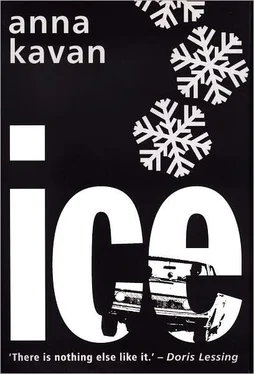Her icing-up world is one of encroachment: the ice creeps towards you, surrounds you, invades you, captures you. Even flight to equatorial regions provides only a temporary relief: the ice inevitably catches up.
Slipstream shifts science (and its effects) into the realm of the unconscious mind, into metaphor, into emotion, into symbols. Slipstream literature is a response to science (and scientific effects), an exercise of human feeling about science, if not an understanding of it. But it is not allegory.
It is tempting, for instance, to take the known fact of Anna Kavan’s years of heroin addiction and suggest that the white ice that engulfs the characters is a literary device, a symbolic representation of the pure-white crystals whose solution she injected daily into her veins. Maybe that comes into it, and maybe that was even in her mind as she wrote, but to work as allegory there has to be an exactness that the reader can grasp. In Ice the symbols are more elusive, mysterious, captivating. It ends as it begins, with nothing that is practical or concluded. The man of action is united with the passive young woman, but their destiny is nowhere near resolved. The encroachment of the ice continues.
‘Anna Kavan’ was a pseudonym for Helen Ferguson, the married name under which the author wrote and sold her first few novels between 1929 and 1937. She continued to write through the Second World War but mostly short stories, and many of these dealt explicitly with her unhappy and unstable psychological state. She made attempts on her life after her second marriage failed and when her son was killed in the war. She spent two long periods in mental hospitals. Some of her most disturbing stories can be found in Asylum Piece, published in 1940. She suffered from a painful spinal disease and began taking heroin for pain relief.
But she also lived an active life. She travelled around the world and lived at different times in New Zealand, Australia, Burma, Switzerland, France and the United States. She eventually returned to London, where she was living at the time of her death. She was a renowned interior decorator. She bred bulldogs. She was an excellent painter. Towards the end of her life she became a small-time property developer, buying, renovating then reselling houses in London. She was fascinated by cars and racing, and in her stories her fictional characters frequently drive around in powerful cars (as they also do in Ice).
Anna Kavan was under-regarded in her lifetime and was just starting to gain critical recognition when she died. It is a great pleasure to introduce this wonderful, compelling and extremely influential novel to a new generation of readers.
Christopher Priest
2006
I was lost, it was already dusk, I had been driving for hours and was practically out of petrol. The idea of being stranded on these lonely hills in the dark appalled me, so I was glad to see a signpost, and coast down to a garage. When I opened a window to speak to the attendant, the air outside was so cold that I turned up my collar. While he was filling the tank he commented on the weather. ‘Never known such cold in this month. Forecast says we’re in for a real bad freeze-up.’ Most of my life was spent abroad, soldiering, or exploring remote areas: but though I had just come from the tropics and freeze-ups meant little to me, I was struck by the ominous sound of his words. Anxious to get on, I asked the way to the village I was making for. ‘You’ll never find it in the dark, it’s right off the beaten track. And those hill roads are dangerous when they’re iced-up.’ He seemed to imply that only a fool would drive on under present conditions, which rather annoyed me. So, cutting short his involved directions, I paid him and drove away, ignoring his last warning shout: ‘Look out for that ice!’
It had got quite dark by now, and I was soon more hopelessly lost than ever. I knew I should have listened to the fellow, but at the same time wished I had not spoken to him at all. For some unknown reason, his remarks had made me uneasy; they seemed a bad omen for the whole expedition, and I began to regret having embarked on it.
I had been doubtful about the trip all along. I had arrived only the previous day, and should have been attending to things in town instead of visiting friends in the country. I myself did not understand my compulsion to see this girl, who had been in my thoughts all the time I was away, although she was not the reason for my return. I had come back to investigate rumours of a mysterious impending emergency in this part of the world. But as soon as I got here she became an obsession, I could think only of her, felt I must see her immediately, nothing else mattered. Of course I knew it was utterly irrational. And so was my present uneasiness: no harm was likely to come to me in my own country; and yet I was becoming more and more anxious as I drove on.
Reality had always been something of an unknown quantity to me. At times this could be disturbing. Now, for instance. I had visited the girl and her husband before, and kept a vivid recollection of the peaceful, prosperous-looking countryside round their home. But this memory was rapidly fading, losing its reality, becoming increasingly unconvincing and indistinct, as I passed no one on the road, never came to a village, saw no lights anywhere. The sky was black, blacker untended hedges towering against it; and when the headlights occasionally showed roadside buildings, these too were always black, apparently uninhabited and more or less in ruins. It was just as if the entire district had been laid waste during my absence.
I began to wonder if I would ever find her in the general disorder. It did not look as if any organized life could have been going on here since whatever disaster had obliterated the villages and wrecked the farms. As far as I could see, no attempt had been made to restore normality. No rebuilding or work on the land had been done, no animals were in the fields.
The road badly needed repairs, the ditches were choked with weeds under the neglected hedges, the whole region appeared to have been left derelict and deserted.
A handful of small white stones hit the windscreen, making me jump. It was so long since I had experienced winter in the north that I failed to recognize the phenomenon. The hail soon turned to snow, diminishing visibility and making driving more difficult. It was bitterly cold, and I became aware of a connexion between this fact and my increasing uneasiness. The garage man had said he had never known it so cold at this time, and my own impression was that it was far too early in the season for ice and snow. Suddenly my anxiety was so acute that I wanted to turn and drive back to town; but the road was too narrow, I was forced to follow its interminable windings up and down hill in the lifeless dark. The surface got worse, it got steeper and more slippery all the time. The unaccustomed cold made my head ache as I stared out, straining my eyes in the effort of trying to avoid icy patches, where the car skidded out of control. When the headlights fled over roadside ruins from time to time, the brief glimpse always surprised me, and vanished before I was sure I had really seen it.
An unearthly whiteness began to bloom on the hedges. I passed a gap and glanced through. For a moment, my lights picked out like searchlights the girl’s naked body, slight as a child’s, ivory white against the dead white of the snow, her hair bright as spun glass. She did not look in my direction. Motionless, she kept her eyes fixed on the walls moving slowly towards her, a glassy, glittering circle of solid ice, of which she was the centre. Dazzling flashes came from the ice-cliffs far over her head; below, the outermost fringes of ice had already reached her, immobilized her, set hard as concrete over her feet and ankles. I watched the ice climb higher, covering knees and thighs, saw her mouth open, a black hole in the white face, heard her thin, agonized scream. I felt no pity for her. On the contrary, I derived an indescribable pleasure from seeing her suffer. I disapproved of my own callousness, but there it was. Various factors had combined to produce it, though they were not extenuating circumstances.
Читать дальше












